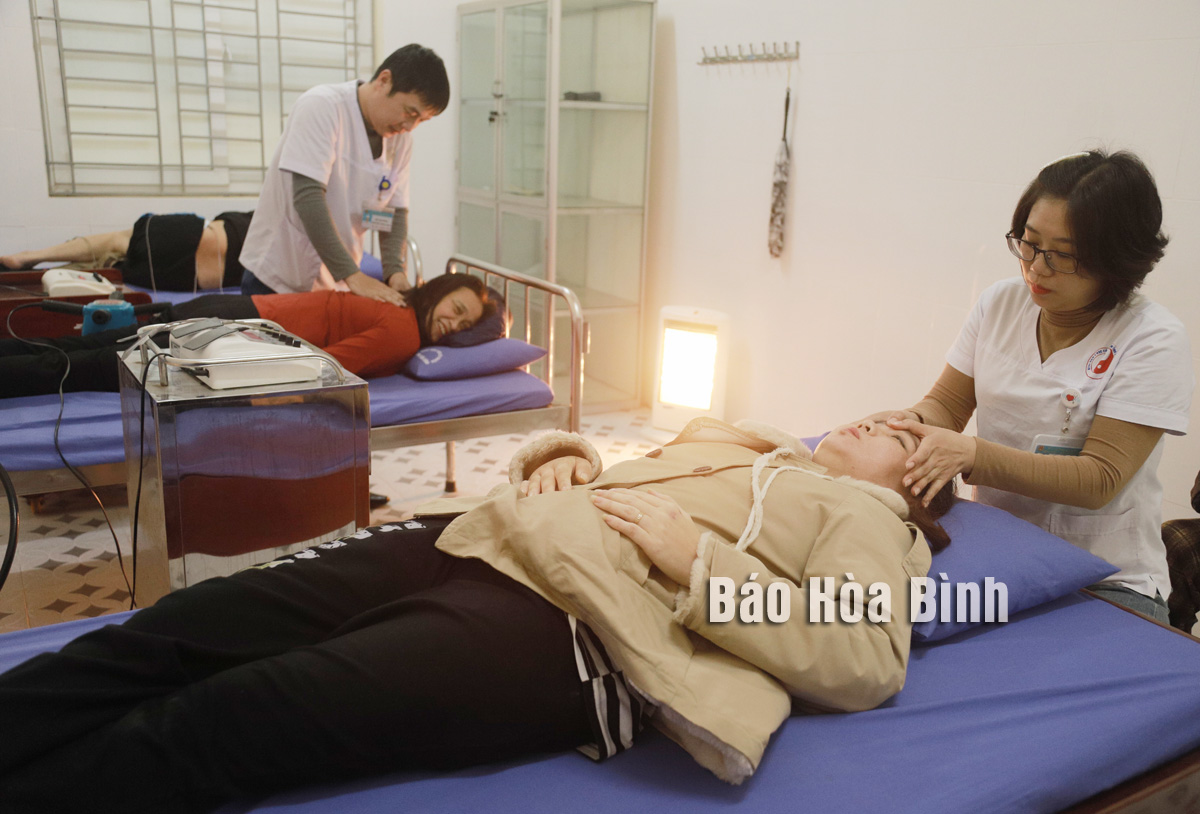
By harmoniously combining traditional medicine with modern medical practices, the Hoa Binh Traditional Medicine Hospital is strengthening its role in the province’s healthcare system.
Staff at the provincial Traditional
Medicine Hospital provide dedicated treatment for patients.
Every year, from the early morning, the hospital
sees a steady flow of patients seeking consultations and treatment. With proper
facilities and dedicated medical staff, it has earned positive feedback from
patients.
Nguyen Thi Tam, a resident of Phuong Lam ward in
Hoa Binh city, said it was her first time receiving treatment at the hospital.
She expressed satisfaction with the modern facilities and attentive staff.
As a specialised hospital under the provincial
Department of Health, the Hoa Binh Traditional Medicine Hospital provides
medical care by integrating traditional and modern treatment methods. It
employs 71 staff members, including 20 doctors, 23 nurses, eight pharmacists,
and seven medical technicians. The hospital operates five departments, offering
100 inpatient beds.
Doctor Sam Huu Hao, the hospital's director,
said patient demand has been on the rise, with over 12,000 people registering
their health insurance-covered primary health care at the hospital over the
last three years. The institution has also had 1,339 medical services approved
to serve locals.
The hospital's advanced equipment, including
digital X-ray machines, rehabilitation robots, and diagnostic tools, has
boosted its capabilities as well as reputation, enabling the hospital to serve
an average of 22,000 patients annually in the last three years, Hao noted.
Looking ahead, the Hoa Binh Traditional Medicine
Hospital aims to further improve treatment quality and establish itself as a
prestigious facility in traditional medicine.
Its development strategy focuses on integrating
traditional medicine with modern rehabilitation techniques. Plans include
expanding specialised rehabilitation services, adding new medical procedures,
and ensuring a stable supply of medicines and medical equipment for check-ups
and treatment.
This year, the hospital is also set to complete
a plan on offering inpatient services and specialised treatment packages on
demand.
More than just an information technology teacher, Bui Van Nien is an inspiring figure who has nurtured the scientific curiosity and creative spirit of students in Vietnam’s ethnic minority communities.
Da Bac is the most disadvantaged mountainous district in Hoa Binh province, with ethnic minorities accounting for about 90% of its population. Over the past years, the district has mobilised resources to implement ethnic policies to improve the quality of life of local people.
In recent years, Hoa Binh province has consistently prioritised the protection, care, and education of children, particularly those from ethnic minorities and disadvantaged backgrounds, by creating a safe, healthy, and nurturing environment for their all-round development.
The Steering Committee for Tobacco Harm Prevention and Control of Hoa Binh province, in coordination with the Tobacco Harm Prevention and Control Fund, held a ceremony on May 28 in response to the World No Tobacco Day (May 31) and the National No Tobacco Week (from May 25 to 31). The event was chaired by Nguyen Van Toan, Standing Vice Chairman of the provincial People’s Committee and head of the Steering Committee.
Since 2021, the Center for Industrial Promotion and Industrial Development Consulting (CIIDC) under the Department of Industry and Trade has been implementing a school lighting model as part of the plan for using energy efficiently and economically in Hoa Binh Province in the pẻiod of 2021 - 2025. This model not only aims to improve the learning conditions and enhance the education quality, but it also promotes the message of energy saving, energy security, environmental protection and contributes to the goals of socio-economic development.
In the 2024 - 2025 school year, the entire Hoa Binh provincial education sector includes 520 educational institutions and schools. Among them are 13 ethnic boarding schools with 153 classes and 4,487 students. Four of these schools have met national standards, reaching 30.7 percent.



